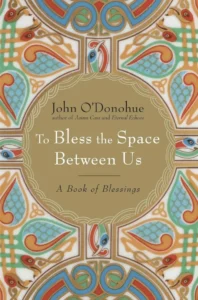How to Bless Each Other: Poet and Philosopher John O’Donohue on the Light Within Us and Between Us
INSPIRATIONAL, 18 Dec 2023
Maria Popova | The Marginalian – TRANSCEND Media Service
 Every once in the bluest moon, if you are lucky, you encounter someone with such powerful and generous light in their eyes that they rekindle the lost light within you and return it magnified; someone whose calm, kind, steady gaze penetrates the very center of your being and, refusing to look away from even the most shadowy parts of you, falls upon you like a benediction.
Every once in the bluest moon, if you are lucky, you encounter someone with such powerful and generous light in their eyes that they rekindle the lost light within you and return it magnified; someone whose calm, kind, steady gaze penetrates the very center of your being and, refusing to look away from even the most shadowy parts of you, falls upon you like a benediction.
That we can do this for each other, but that it happens so rarely, is both the great miracle and the great tragedy, for there is no loneliness like the loneliness of having your light unmet.
The great Irish poet and philosopher John O’Donohue (January 1, 1956–January 4, 2008) takes up these immense and intimate questions in the opening pages of his altogether wonderful final book To Bless the Space Between Us: A Book of Blessings (public library) — his parting gift to the world, published just before his untimely death, celebrating “the gift that a blessing can be, the doors it can open, the healing and transfiguration it can bring” and inviting us to “rediscover our power to bless one another.”

He writes:
There is a quiet light that shines in every heart. It draws no attention to itself, though it is always secretly there. It is what illuminates our minds to see beauty, our desire to seek possibility, and our hearts to love life. Without this subtle quickening our days would be empty and wearisome, and no horizon would ever awaken our longing. Our passion for life is quietly sustained from somewhere in us that is wedded to the energy and excitement of life. This shy inner light is what enables us to recognize and receive our very presence here as blessing.
The even greater blessing is our presence here together, as mirrors and magnifiers of each other’s light. “Whenever you give a blessing, a blessing returns to enfold you,” O’Donohue reminds us. At their best, at their rarest, those moments of profound light-to-light connection are thresholds, portals to transformation, invitations to a more radiant life.
With an eye to “that tenuous territory of change that we must traverse when a threshold invites us,” O’Donohue writes:
Without warning, thresholds can open directly before our feet… In the ecstasy and loneliness of one’s life, there are certain times when blessing is nearer to us.
To step across the threshold with courage and openheartedness is to honor the truth and sanctity of our experience, of our light — it is to bless ourselves:
The structures of our experience are the windows into the divine. When we are true to the call of experience, we are true to God.
Complement with a blind hero of the French resistance on how to live in light, a Baldwin-lensed meditation on the light between us, and David Whyte’s “Blessing for the Light,” inspired by John O’Donohue, then revisit O’Donohue on why we fall in love and the essence of friendship.
_______________________________________
 My name is Maria Popova — a reader, a wonderer, and a lover of reality who makes sense of the world and herself through the essential inner dialogue that is the act of writing. The Marginalian (which bore the unbearable name Brain Pickings for its first 15 years) is my one-woman labor of love, exploring what it means to live a decent, inspired, substantive life of purpose and gladness. Founded in 2006 as a weekly email to seven friends, eventually brought online and now included in the Library of Congress permanent web archive, it is a record of my own becoming as a person — intellectually, creatively, spiritually, poetically — drawn from my extended marginalia on the search for meaning across literature, science, art, philosophy, and the various other tendrils of human thought and feeling. A private inquiry irradiated by the ultimate question, the great quickening of wonderment that binds us all: What is all this? (More…)
My name is Maria Popova — a reader, a wonderer, and a lover of reality who makes sense of the world and herself through the essential inner dialogue that is the act of writing. The Marginalian (which bore the unbearable name Brain Pickings for its first 15 years) is my one-woman labor of love, exploring what it means to live a decent, inspired, substantive life of purpose and gladness. Founded in 2006 as a weekly email to seven friends, eventually brought online and now included in the Library of Congress permanent web archive, it is a record of my own becoming as a person — intellectually, creatively, spiritually, poetically — drawn from my extended marginalia on the search for meaning across literature, science, art, philosophy, and the various other tendrils of human thought and feeling. A private inquiry irradiated by the ultimate question, the great quickening of wonderment that binds us all: What is all this? (More…)
Go to Original – themarginalian.org
Tags: Inspirational
DISCLAIMER: The statements, views and opinions expressed in pieces republished here are solely those of the authors and do not necessarily represent those of TMS. In accordance with title 17 U.S.C. section 107, this material is distributed without profit to those who have expressed a prior interest in receiving the included information for research and educational purposes. TMS has no affiliation whatsoever with the originator of this article nor is TMS endorsed or sponsored by the originator. “GO TO ORIGINAL” links are provided as a convenience to our readers and allow for verification of authenticity. However, as originating pages are often updated by their originating host sites, the versions posted may not match the versions our readers view when clicking the “GO TO ORIGINAL” links. This site contains copyrighted material the use of which has not always been specifically authorized by the copyright owner. We are making such material available in our efforts to advance understanding of environmental, political, human rights, economic, democracy, scientific, and social justice issues, etc. We believe this constitutes a ‘fair use’ of any such copyrighted material as provided for in section 107 of the US Copyright Law. In accordance with Title 17 U.S.C. Section 107, the material on this site is distributed without profit to those who have expressed a prior interest in receiving the included information for research and educational purposes. For more information go to: http://www.law.cornell.edu/uscode/17/107.shtml. If you wish to use copyrighted material from this site for purposes of your own that go beyond ‘fair use’, you must obtain permission from the copyright owner.